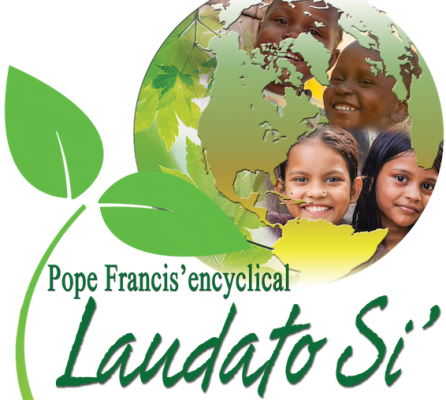Pope Francis wrote his encyclical, “Laudato Si’” for “every person living on the planet” not only to read but also to “enter into dialogue with all people about our common home.” In an effort to keep the conversations going, The Visitor is publishing a six-part faith formation series in which guest writers help to “unpack” what the Holy Father said in the letter and offer reflection questions and actions to respond to his message. This useful guide is intended to help readers grasp the overall content and encourage further study and dialogue in homes and parishes. This is part four of the series.
For me, the most poignant moment of Pope Francis’ recent visit to the U.S. took place on Sunday morning, Sept. 27, as he was leaving the Philadelphia airport for Rome.
As his motorcade made its way to the waiting flight, he motioned for the driver to stop the car so he could get out and bless Michael Keating, a 10-year-old boy in a wheelchair, and to greet his family. To the very end of his visit, the Holy Father exhibited the compassion which consumed his patron, St. Francis, in his awareness of everything around him.
Indeed, Pope Francis roots the title of Chapter 4, “Integral Ecology” in the joyful and authentic way the saint from Assisi lived out his care for the vulnerable (Laudato Si’, p. 15). In our own day, that vulnerability encompasses the very environment which sustains us and which “cries out to us because of the harm we have inflicted on her” (p. 9).
In this chapter, Pope Francis speaks of five components of this “integral ecology” which must serve as the foundation for any call to action on behalf of our common home. First, a brief summary of each component:
- Environmental, Economic, and Social Ecology. Ecology studies the relationship between living organisms and the environment in which they develop. This environment is both natural and social, and all areas of research (e.g. biology, technology, sociology and economics) must be in dialogue in order to construct an effective response to the global crisis we face.
-

Maureen Otremba holds an M.A. in Theology from St. John’s University. Together with her husband, Jim, she is a frequent speaker on topics relating to Catholic marriage, parenting and faith. Resources can be found at www.eucharistic marriage.com. Cultural Ecology. Not only is our physical environment endangered by modern life, but our cultural heritage is also threatened. The cultural treasures of humanity in both its past and present reality must figure into the equation for sustainable and harmonious living.
- Ecology of Daily Life. Housing, public transportation and the bond between human life and the moral law all come to bear on our relationship to our environment. Though poverty poses formidable challenges, Pope Francis insists that “love always proves more powerful” (p. 112).
- Principle of the Common Good. This section reiterates the importance of subsidiarity, the role of the family and the church’s call for solidarity and the preferential option for the poor in our understanding of human ecology.
- . Rampant individualism and the expectation of instant gratification blind us to our role as receivers of this world from our ancestors and stewards for the coming generations. We must ensure that we are leaving an inhabitable home for those who come after us.
In 16 brief pages, Pope Francis touches on virtually every aspect of Catholic social teaching, which can almost seem overwhelming! But taking to heart his exhortation that “rather than a problem to be solved, the world is a joyful mystery to be contemplated with gladness and praise” (p. 17), what lessons can we ponder from these five components of integral ecology? Here are three to consider: - The affirmation of our bodies must be the starting point for our attitude toward the environment. Pope Francis states, “The acceptance of our bodies as God’s gift is vital for welcoming and accepting the entire world as a gift from the Father and our common home, whereas thinking that we enjoy absolute power over our bodies turns, often subtly, into thinking that we enjoy absolute power over creation” (pp. 115-116). Treating our bodies with respect according to the way God created us is the starting point for reverence and care for our environment.
- The affirmation of human dignity is the foundation of any effective approach to the global crisis. Pope Francis repeatedly mentions factors that foster human dignity as well as those that threaten it. The surrounding world, as God’s gift to us, is one means by which we attain the dignity God bestowed in creating us in the divine image.
- It is going to require solidarity among cultures, academic and professional disciplines and between generations to overcome the indifference which marks many people’s attitude toward the ecological crisis facing our planet. In the letter’s introduction, Pope Francis laments the
 “denial of the problem, nonchalant resignation [and] blind confidence in technical solutions” (p. 18) which typify problematic opinions, even of many believers. “Integral ecology” stresses the importance of cooperation among distinct disciplines in order to arrive at a comprehensive solution to the ecological problems we face.
“denial of the problem, nonchalant resignation [and] blind confidence in technical solutions” (p. 18) which typify problematic opinions, even of many believers. “Integral ecology” stresses the importance of cooperation among distinct disciplines in order to arrive at a comprehensive solution to the ecological problems we face.
Clearly, these teachings are challenging. I find encouragement in another section of the introduction, where Pope Francis writes, “All of us can cooperate as instruments of God for the care of creation, each according to his or her own culture, experience, involvement and talents” (p. 19). Even St. Francis himself, in the Canticle that gave its name to this encyclical letter, encourages us: “Happy those who endure in peace/For by You, Most High, they will be crowned” (“Canticle of the Sun”).






















